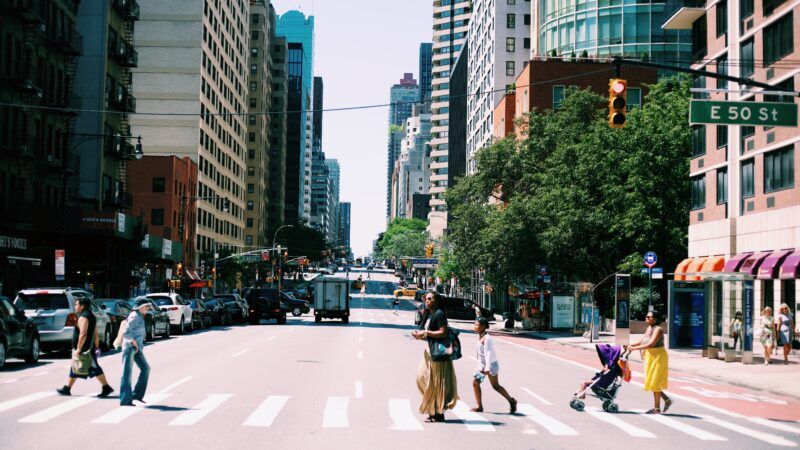Politics Is Getting in the Way of What Makes Cities Great
Healthy cities are a boon not just for those who live in them, but for our entire society.

Progressives loves cities, yet refuse to address the degree to which their policies have made urban life a bigger chore than needed. Conservatives depict cities as dystopian hellholes. They delight in highlighting the crime problems, poorly functional school systems, homeless encampments, and other urban problems that seem unsolvable.
The message from the former: We should all live in densely packed urban areas, where we can stroll to cafes and stores and take the bus to work, but we can't (or won't) make the streets safer, the schools better or the transit systems less miserable. The message from the latter: Stay away from cities and hole up in placid but uninteresting suburbs.
There is a third way, of course. It means supporting reform policies that improve life in the city. Like everything these days, the right v. left culture wars have tainted debates about urban governance. Urban policy need not be so partisan—but it becomes that way for obvious reasons. Democrats dominate the politics of virtually every big city and Republicans often dominate the outskirts.
Lefties hector people for wanting to flee. They bloviate about the car culture and try to shut down charter schools. They elect district attorneys who are lackadaisical about prosecuting street crime, pass rent controls that drive up the cost of housing and have never met a tax increase they don't like. They make it inordinately difficult for small businesses to get through the regulatory thicket.
Righties gleefully point to, say, the phone app that helps people navigate the piles of human poop that are an unfortunate reality on San Francisco's homeless-filled streets. They use the laundry list of urban failures as proof that Democrats turn everything they touch into a disaster. They don't seem to care about cities, but use them as a punching bag to highlight their opponents' failures.
It's time to break this impasse. Healthy cities are a boon not just for those who live in them, but for our entire society which benefits from the culture, diversity, and intellectual stimulation that they offer.
Conservatives are right that liberals have controlled our biggest cities for decades and they have become a mess. In the 1950s, Detroit was one of the world's wealthiest cities. By the 1980s, it had turned into the definition of blight. The city even has an agency that knocks down empty houses. Locals joke about the city's rural sprawl—as abandoned neighborhoods become vacant land.
Western cities have fared better than many industrial Midwestern metropolises. Our cities have continued to grow, but recently we've seen that trend reversed. San Francisco remains one of the most beautiful cities in the country, yet it lost 6.3 percent of its population from 2020 to 2021. Los Angeles lost 160,000 residents in 2021. That's largely a function of failed policy. At this rate, our great cities might resemble the Motor City 40 years from now.
What to do? The progressive approach has been to throw money at the myriad problems—housing, transportation, homelessness, crime, and education—but not change any of the ways those public services are provided. That's because progressives generally are hostile to the marketplace and have an inexplicable faith in governments and the unions that control government agencies. Yet union control results in overpriced and lower-quality public services. Union contracts crowd out other services.
In the mid-2000s, Anaheim pioneered an innovative approach. It relaxed zoning laws to promote construction. The city changed the culture within its government agencies to be more "freedom friendly" in its approach to permitting. Although the city later abandoned these goals, the core idea was to let individuals rather than government make more decisions.
Every city needs innovation and competition. School choice enables urban residents to stay in their neighborhoods rather than flee to the suburbs. Transit systems have the hallmarks of any government-run agency. They are dirty, bleak, and increasingly unsafe. Is it any wonder that transit ridership is falling dramatically almost everywhere? The problem isn't transit per se, but how that transit is provided.
The progressive answer is to limit car use and impose "road diets" that boost congestion and try to force people to get out of cars. The alternative answer should be to make transit more appealing by encouraging market alternatives and customer-friendly reforms to the existing public systems. Choice always is better than coercion.
In other examples, community policing can approach crime problems in a more humanitarian and results-oriented way. Cities can reduce regulations and let nonprofits build low-cost housing for the homeless—a far better approach than building $800,000 government-funded units. There are plenty of ideas, almost all of which involve community participation, competition, and market-based alternatives.
If progressives are serious about promoting urban living, they should unite with conservatives who are serious about reforming government services. Our cities can remain great places, but it means breaking out of our self-defeating partisan rut.
This column was first published in The Orange County Register.


Show Comments (114)